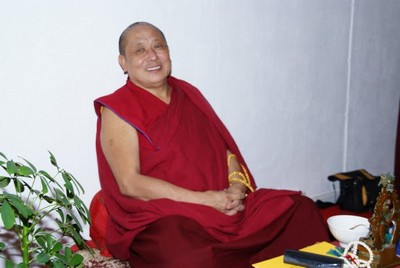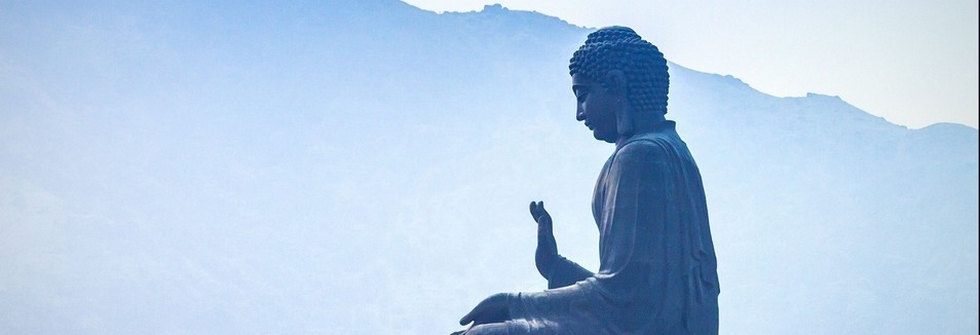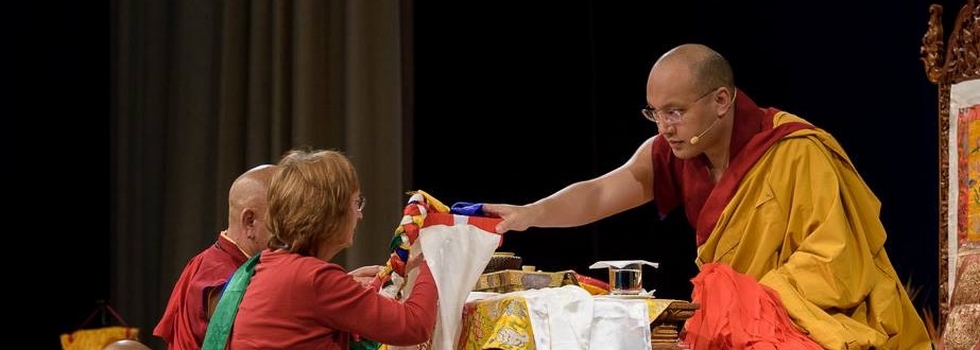Starting Where We Are

Venerable Chöje Lama Phuntsok
Teachings presented during the Manjushri Retreat at
Karma Chang Chub Choephel Ling, Heidelberg, in October 2009.
"Until I awaken, I take refuge in
The Buddha, the Dharma, and the Supreme Assembly.
Through the goodness of generosity and other virtues
May I awaken fully in order to help all beings."
"Namo Guru Manjushri Ye"
During this seminar we are discussing what it means to be a Bodhisattva, specifically with regard to shes-rab, -wisdom-awareness,' which is represented by Noble Manjushri. As mentioned in my article, Becoming and Being a Bodhisattva, a Bodhisattva is not a deity depicted in a painting or statue. Everyone is free to become a Bodhisattva, who is characterized by three qualities that we should reflect and practice.
The Tibetan translation of the Sanskrit term Bodhisattva is byang-chub-sems-pa. The Tibetan term sems-pa means -conscious apprehension' and refers to someone who has a great mind, sems-chen-po-yöd-pa. Someone who has a great mind is courageous, i.e., he or she is someone who courageously engages in the three qualities of a Bodhisattva. The three qualities are: (1) A Bodhisattva never grows tired or becomes weary of working to accomplish the aim of liberating beings from suffering, no matter how hard it might be; (2) a Bodhisattva never hesitates helping other beings, no matter how many there are; (3) a Bodhisattva never stops helping others, no matter how long it will take. It is impossible to be a Bodhisattva without having these three qualities. Nobody can immediately become a Bodhisattva, but everyone who has this wish needs to develop these three qualities by practicing them gradually and step by step. Someone who aspires to become a Bodhisattva should know what to practice and what chang-chub-kyi-sems (-the mind of awakening,' Bodhicitta in Sanskrit) means and what it entails.
We cannot seize or grasp the mind of awakening by looking at it, because it has no color and no form. What is it then? It is an object of thought. What do we think? As it is, we seek ways to attain happiness and to avoid suffering and pain. Having chang-chub-kyi-sems means having loving kindness (the wish that others have happiness) and compassion (the wish that others to be free of suffering and pain). Mind of awakening means knowing that "Just as I want to be happy and free of suffering, all living beings want to be happy and free of suffering and pain." We will have found our mind of loving kindness and compassion when we think that others want happiness and want to be free of suffering just as we want this, too. It isn't necessary to practice having this thought, since everyone naturally has it.
There are so very many living beings that aren't able to do what is needed in order to be happy and free of suffering. We can decide to be of service to them and can give rise to the vast, heart-felt wish, "May I help all living beings attain happiness and freedom from suffering." We most likely won't be able to put our great motivation into practice, but we can start where we are and help one, or two, or ten, or maybe one hundred people be happy and free of suffering. We have loving kindness and compassion and can expand it. By seeking ever more reliable means to be of service, we can help more and more living beings in better ways. For example, we can help the sick receive medicine that they need in order to become well, or we can give food to the hungry. We can find out what we can do to help others as best as we can. When we try to put our great motivation into action by finding the means to help those in need, then that is practicing the way of a Bodhisattva. But we need to check whether the help we can give is effective, i.e., whether the medicine that we can give really helps the sick, or the food that we can give really helps those who are hungry. It's important to know what we should and shouldn't do so that we don't hurt but benefit others.
Practicing to be of service to others, we shouldn't merely concentrate on helping a few human beings only. We need to protect the environment, too, and take care that the elements aren't disturbed, rather, allowing them to remain balanced. In this way, we benefit very many living beings in Jambuling, our World.
At this time, the five elements are very disturbed and as a result they wreck havoc. Many living beings suffer when the elements aren't balanced. We thus need to be of help by protecting nature. We can start right away to help many living beings by doing our very best and as much as we possibly can to protect the water, the air, the forests, the Earth. But what can we, as individuals, do to protect the Earth? For example, we can use less paper. We use so much paper, more and more every day. Paper is made from wood that grows in the forests, so, the more paper we use, the more trees will be felled. We wouldn't only be helping mankind by using less paper, but we would also be doing so much for many other living beings. Forests are connected with earth, water, and air, and many living beings inhabit those spaces. So, minimizing our use of paper would be a big help for nature and for a huge number of living beings. If many people, maybe 100.000, started using less paper, the less trees would be felled and the forests that are a home for many living beings would be preserved and could grow. Thinking in these lines is very beneficial. It is the practice of mind training and causes our mind to become purer and purer. The purer our mind is, the more easily love and compassion will awaken in us. It is taught that we should meditate love and compassion, so it's necessary to prepare the ground for this practice by cultivating a pure and good heart.
How can we start meditating love and compassion? For instance, we can give rise to a vast state of mind the moment we wake up in the morning. After we get up, we can focus our attention for a short while on the intention of benefitting as many living beings as possible and not harming anyone the whole day. That is what we can do after we wake up and get out of bed. When we are involved with our daily obligations, sometimes we encounter good situations and often we encounter negative situations. If we experience something that isn't so good, negative emotions arise in us, like anger or scorn. In moments like that we can recall the intention we had when we got up that morning, namely, not to hurt anybody but to do as much good as possible. Our anger will almost dissolve if we bring our resolution to mind when situations like that happen. Or, if we see something that is pleasant and nice in a shop window or while strolling through a department store, we might think, "Oh, I want to own all those things." If we buy the one or other thing that we desired or thought we needed and are home again, we might find that the one thing is useful, but that many of the things that we bought are useless. Then we realize that we wasted our money. Recognizing that a negative emotion has arisen in our mind when we are greedy for things that we see, we can ask, "Of what use are those things that I think I need to own and want to buy?" In that way, we can avoid wasting so much money and resources. Noticing negative thoughts when they arise and not following after them is a great blessing.
There are two ways of thinking, positive and negative. When our positive thoughts increase, we will automatically have less negative thoughts. Therefore, when getting up in the morning, it is very good to resolve to only do what is beneficial for others and not to hurt anyone. Of course, negative thoughts will have arisen in our mind by noontime, so it's important to again and again recall our resolution. Practicing in this way enables us to weaken and eradicate our negative thoughts and emotions.
In the evening, before going to sleep, we can reflect our day. We remember that we resolved not to hurt anybody but only to be of service when we got up. We ask ourselves, "How was my day? Could I live up to my resolution?" If we notice, "Yes, I managed more or less," then we are happy. If we notice, "No, I couldn't really live up to my intention," then we regret our misbehaviour and resolve to be better the next day. Practicing like this is what is referred to as "mind training." If we practice in this way again and again, then eventually we will become a Bodhisattva. It's impossible to become a Bodhisattva suddenly and overnight, rather, we have to work on becoming a Bodhisattva.
We can say in short: "A Bodhisattva is someone with a good heart." In Buddhism, anyone who has a good heart is called "a Bodhisattva." Whoever has a good heart and lives a good life is respected and honoured in communities and by society. So, it is our responsibility to become a Bodhisattva by practicing the way of a Bodhisattva, step by step. We will be able to accomplish the three qualities of a Bodhisattva, which are: Never growing tired of working to liberate beings from suffering, no matter how hard it might be; never hesitating to help beings, no matter how many there are; and never stopping to help others, no matter how long it will take. When we have these three characteristics of a Bodhisattva, then we have become Bodhisattva Chenrezig, Lord of Compassion. Meditation deities aren't outside ourselves, but they are within us.
I want to ask you to think about the reason, rgyu-mtshän, we can become a Bodhisattva. We will not receive a blessing that turns us into a Bodhisattva as long as we think that a Bodhisattva is outside of us and pray to him with thoughts like that in mind. We need to become a Bodhisattva inside ourselves, and we can by practicing the three qualities described above. It is appropriate to refer to someone who has these three qualities as a Bodhisattva. In any case, that is what I think. What do you think?
We can practice as long as we want, but seeing a Bodhisattva outside ourselves will not cause us to become a Bodhisattva. We can meditate as long as we want, but nothing will change as long as we think that Bodhisattva Manjushri and Bodhisattva Chenrezig are outside and we are only simple and ordinary. We need to awaken Manjushri and Chenrezig within ourselves, thereby developing true wisdom and heart-felt loving kindness and compassion. The foundation is having the great motivation of a pure mind.
There is a saying in Tibet that is: "Everything one does will be beneficial if one has a pure mind. Anything one does will be harmful if one has an impure mind." I want to tell the story about the benefit of anything one does with a pure mind. Since people from the East and West think differently, we'll see if Westerners appreciate this cultural practice of India.
As you know, the Ganges River flows through Varanasi in Uttar Pradesh. Once a mother and her little daughter were travelling on a boat on the river. When the rickety boat capsized, the mother only had one thought, "It doesn't matter if I drown. My only wish is that my daughter is saved." The little girl had the same wish and thought, "It doesn't matter if I die. My only wish is that my mother is saved." They both drowned and were reborn in the realm of the gods. A Hindu Brahmin who was sitting at the shore saw this and thought, "If one drowns in the Ganges River, one is born in the realm of the gods." He wrote this down, had it published, and ever since then all Hindus bathe in the Ganges River. Nepali people also carry out the ritual bath. And so, it has become the tradition in Hinduism to dip a corpse in the Ganges River before the body is cremated. Buddhists know that one isn't automatically born in a realm of the gods because one bathed or drowned in the Ganges River, rather, they know that it's a matter of one's motivation and the purity of one's mind that determine where one will be reborn. Did you understand the story? Let me tell the story about what can happen if one has negative thoughts.
Once upon a time there was a king in India. He lived in an exquisite palace that had a huge iron gate at its entrance. There was a wooden gate in front of the iron gate, so two gates shielded him. Waiting to receive alms, a beggar always sat and slept in front of the wooden gate. In days of old, kings didn't have a car or motorcycle but rode in carriages. The beggar thought, "One day the king will leave his palace in his carriage. If a wheel breaks and the carriage crashes, he will die. Then I can take my seat in the carriage and I will be the king." Having had this thought, he stretched out and fell asleep. In the meantime, the king rode through the gates of his palace in his carriage. Since he was asleep, the beggar didn't notice and the carriage ran over him, dissevering his head from his body. There are many similar stories that illustrate in which way a negative state of mind can only lead to negative experiences. They show that it is important to have wholesome thoughts and to develop a positive mind. I can't judge what you think of stories like this, but maybe this one is to the point.
Momentarily there is much talk about the swine flue. A few people have died and now people worldwide are afraid. This shows that just like the Brahmin who purportedly saw the mother and daughter who drowned in the Ganges River reborn in the heaven of the gods initiated the tradition of dipping a corpse into the river before it is cremated, the death of a few people from the swine flue has turned into a global concern. A few cases have been registered, but it is doubtful whether the swine flue will become a global epidemic. Therefore, it's very important to develop a positive mind. These stories underline quite well that things will develop negatively if we see them in such a way.
If we reflect how many hours we spend every day with negative thoughts and how many hours we spend every day with positive thoughts, we will notice that the one or other attitude dominates our lives more or less in dependence on situations and conditions. In any case, it is very useful to notice what is occurring in our mind and to check whether we are involved with positive or negative thoughts. It is a grave error not to notice at all what is taking place in our mind, because then slightest negative situations drive us to become involved with negativities, such as anger and the like. If we don't notice, then our anger becomes bigger and bigger. If we are able to notice that anger, for instance, has arisen in our mind, then it will become smaller and smaller. We should see how thoughts and emotions arise in our mind and identify them. Another person needn't be the cause of our anger. For example, we can become angry if we bump our head against a door while heedlessly walking around. It's not the door's fault but our own lack of awareness. Who should we blame for having bumped our head against the door? Who should we be angry with? Noticing that we are angry with the door makes us see how silly that is. Therefore it's important to think about the causes and conditions of our negative emotions. It's very beneficial to be aware of our mental activities, and that is what practice is about.
What else is there to say about being a Bodhisattva? It's not easy to become a Bodhisattva. We would all be Bodhisattvas if it were easy. What do you think? Is it easy or hard? We have planted the seed by aspiring to develop a good heart. If we are diligent, the seed will sprout and ripen into a fully grown Bodhisattva. In any case, a Bodhisattva doesn't exist outside of us but is within each and every one of us.
In Buddhism, no meditation deity is other than our own mind. The meditation deities can only be found within our own mind. That is why Arya Maitreya wrote in The Uttaratantrashastra (rGyud-bla-ma - -The Unexcelled Continuity'): "All living beings have Buddha nature." What is the Buddha nature? Our own mind. Our Buddha nature is like a seed. When the seed that is Buddha nature has fully ripened, then we are a buddha. We are wandering in the cycle of conditioned existence, samsara, because we are ignorant, haven't awakened, and haven't realized our Buddha nature. Since we don't know that we are always and already a buddha, we need to develop our wisdom-awareness, shes-rab, with which we dispel the delusions that darken our mind with negative thoughts and emotions and as a result conceal our Buddha nature.
It's important for Dharma practitioners to know that everything is in our mind. Attaining Buddhahood or remaining bound in samsara depend upon our mind. At this time, we have qualities and faults. When defects dominate, we are in samsara. When positive qualities dominate, we awaken. What faults do we have? Anger, pride, jealousy, miserliness, etc. We call them "negative emotions, defects, or mind poisons." When we are angry, for instance, and ask, "Where does anger reside?" we can only answer, "In our mind." There is no mind outside or other than the anger that we might have. Anger is a thought, and it is a very strong mental activity. It doesn't arise in us when our mind is at peace. Like that, sometimes our mind is filled with anger, sometimes it is filled with jealousy, pride, etc. All such thoughts are defects that cause us to do negative things.
Before we do anything, we have the thought, e.g., we first have the thought to write a letter and then we write it. In Buddhism, it is said that our mind is the king and our speech and body are its servants, therefore our thoughts are paramount. What do you think? Is our mind as mighty as a king? Is it the boss?
Student: "Oh yes."
Lama Phuntsok: Is our mind really the ruler?
Translator: "I heard of scientific discoveries that state that activities precede mental activities."
Other student: "No, the thought comes first."
Translator: "Neurologists are presently arguing this point."
Lama Phuntsok: Buddhism teaches that we first have the thought and then we act.
Other student: "Isn't it possible to act unconsciously, which is also a matter of mind?"
Lama Phuntsok: Whether consciously or unconsciously, a mental activity will have taken place, otherwise we would never be able to stand up and walk.
Other student: "In science, it's a discussion of free will."
Lama Phuntsok: I don't trust science that much. It can't be the case that we can stand up without having a free will. We must have the thought that we want to stand up before we do. We won't stand up without having made the decision.
Next question: "What happens in dreams, for example, when one dreams and wakes up screaming or crying?"
Lama Phuntsok: Of course, one didn't have the thought of crying or screaming while one was dreaming. The cause of those reactions is in the dream. It's a question of whether decisions are made consciously or unconsciously. The sensory consciousnesses are inactive while one sleeps and dreams, and everything that one experiences then is based on the mind consciousness.
Next question: "Lama just said that the mind is always the king. If I slept badly all night and have lots of work to do the next day, then I can give rise to the thought of being loving and compassionate to everyone I meet, but I can't manage."
Lama Phuntsok: Why are you tired?
Same student: "Lots of work. And then my 4-month-old daughter cries all night."
Lama Phuntsok: Yes, when the king is tired, the servants can't function well. A king needs to be in a good state if he wants to instruct his servants well, which doesn't always function.
Same student: "No, it doesn't always function! That's why I think that if the body isn't in a good condition, the mind can't be the king."
Lama Phuntsok: The mind is always the king. Sometimes we have a headache and have to have the thought to go to the doctor to get medicine. Our head doesn't go on its own.
Other student: "It seems that Lama makes no difference between thoughts and emotions."
Lama Phuntsok: Yes, negative emotions are thoughts and we can differentiate between subtle and coarse thoughts. So, when you have a headache, you have to decide to go to the doctor. Therefore, the mind is the king. – Thank you.
.
Dedication
Through this goodness, may omniscience be attained
and thereby may every enemy (mental defilement) be overcome.
May beings be liberated from the ocean of samsara
that is troubled by waves of birth, old age, sickness, and death.
By this virtue may I quickly attain the state of Guru Buddha, and then
lead every being without exception to that very state!
May precious and supreme Bodhicitta that has not been generated now be so,
and may precious Bodhicitta that has already been never decline, but continuously increase!
May the life of the Glorious Lama remain steadfast and firm.
May peace and happiness fully arise for beings as limitless in number as space is vast in its extent.
Having accumulated merit and purified negativities, may I and all living beings without exception
swiftly establish the levels and grounds of Buddhahood.
Photo of Venerable Chöje Lama Phuntsok offering teachings at Karma Lekshey Ling at Weißenthurm, Germany, in October 2009. Photo of gorgeous waterfall in New Zealand taken this November and generously offered by Nina Kerklau. Special thanks to Michael Slaby for having recorded the teachings presented in Heidelberg and for having made the CD available to us, and wonderful thanks to Lama Dorothea Nett for having organized this most auspicious event. In reliance on the fabulous simultaneous translation of Tibetan into German by Hannelore Wenderoth, these teachings were translated into English and arranged by Gaby Hollmann, responsible and apologizing for any mistakes. All persons and institutes mentioned here have copyright for their contribution. Lama Phuntsok's article is made available by the Dharma Download Project of Khenpo Karma Namgyal at Karma Lekshey Ling Institute in Kathmandu, by Karma Chang Chub Choephel Ling in Heidelberg, and by Karma Sherab Ling in Münster for personal use only; it may not be reproduced in any form nor be published. Munich, 2009.















